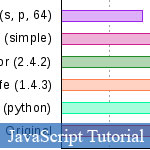









 compression JavaScript est l'une des missions les plus importantes pour optimiser les performances de la page web Outre minifying la taille du code source JavaScript/fichiers ( rapetisser JS / compresser les fichiers JavaScript ) Pour diminuer le temps de chargement, des compresseurs JavaScript ?galement de nombreuses optimisations (compression) pour votre code source JavaScript Aujourd'hui, dans ce message,
compression JavaScript est l'une des missions les plus importantes pour optimiser les performances de la page web Outre minifying la taille du code source JavaScript/fichiers ( rapetisser JS / compresser les fichiers JavaScript ) Pour diminuer le temps de chargement, des compresseurs JavaScript ?galement de nombreuses optimisations (compression) pour votre code source JavaScript Aujourd'hui, dans ce message, jsB@nk voudrais vous montrer les r?sultats des comparaisons de certains compresseurs JavaScript populaires: Packer 3.1, YUI Compressor, Google fermeture, Dojo Shrinksafe et JSMin.
So following on from last weeks post I have taken a closer look at the common tools used to compress JavaScript. Below is a graph of the compression ratios that these tools achieved when applied to ext-all-debug.js, the uncompressed JavaScript from the popular ExtJS framework :
Some points to note are:
Below is a graph of the processing time required for the above compressions:
Aside from Packer, there is not a lot of difference, and since all of the processing is done before deployment the compression cost does not impact the performance of the JavaScript.
The final graph below shows the compression ratios where each of the compressed JavaScript files are then GZipped, as is more typical of production environments.
In the final analysis it is clear that you should GZip your JavaScript, although be aware that not all browsers correctly handle GZipped content. As to which of the other compression tools you use, it comes down to your JavaScript. My experience showed Packer to produce the best results for ext-all-debug.js whereas Julien found that the YUI Compressor is a better choice for jQuery. CompressorRater can help with this task although it does not yet include Google Closure.